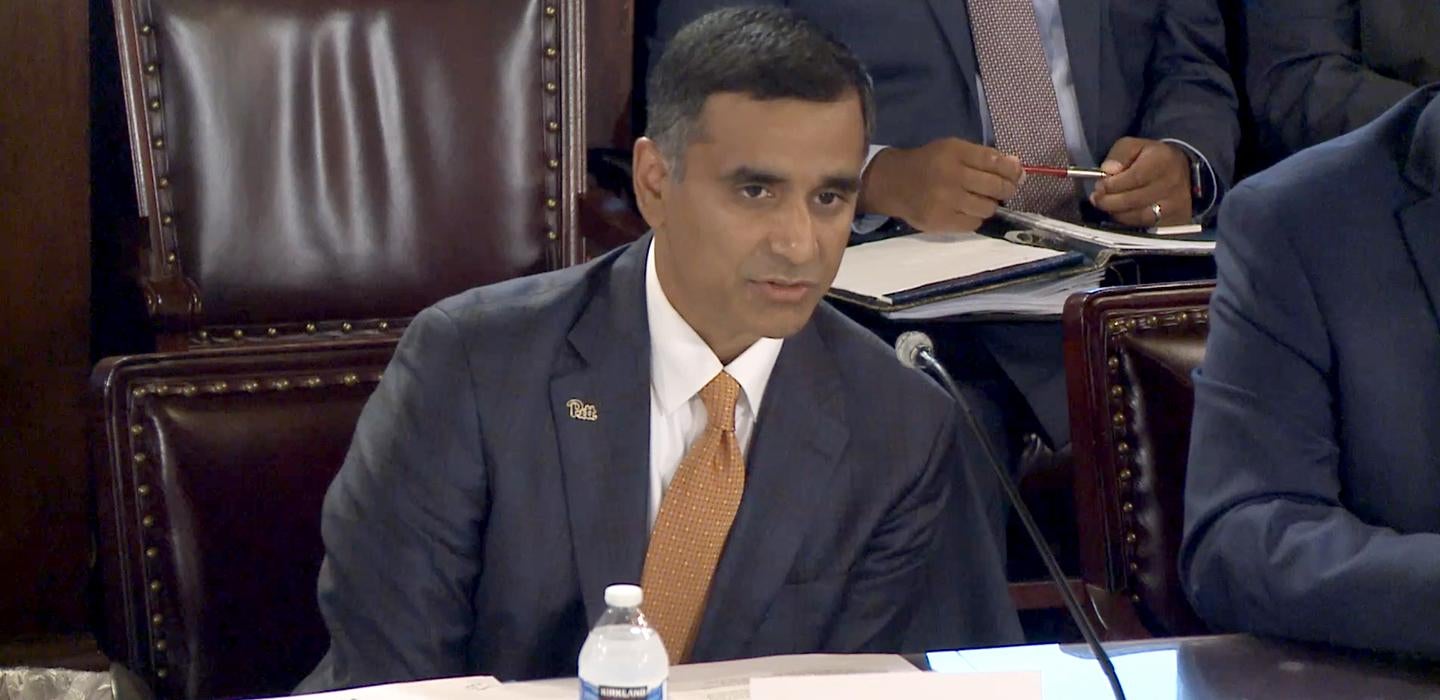
Subscribe to Pittwire Today
Get the most interesting and important stories from the University of Pittsburgh.Testifying in Harrisburg this week, University of Pittsburgh Senior Vice Chancellor and Chief Financial Officer Hari Sastry reminded state legislators that the commonwealth’s investment in Pitt and other state-related universities makes a critical difference for Pennsylvania students and their families.
Sastry spoke before a joint committee of representatives in Harrisburg as part of an Oct. 4 hearing on higher education funding alongside counterparts from Penn State, Temple and Lincoln universities, as well as the University of Pennsylvania’s School of Veterinary Medicine and School of Medicine.
The hearing came at a pivotal moment after a proposal was circulated in Harrisburg that would strip all funding from Pitt, Penn State and Temple universities — a move that would have significant consequences for students at all Pitt campuses. Since 1966, Pitt has received funding from the state in exchange for lower tuition for Pennsylvania residents.
“We received about $152 million in our commonwealth appropriation last year, which we leveraged to provide nearly $300 million in in-state tuition discounts for Pennsylvania residents,” Sastry said. “Dollar for dollar, that money goes directly to an in-state discount and then supports Pennsylvania students that attend the University of Pittsburgh.”
Pennsylvania students pay $15,000 less for tuition on average than their out-of-state peers. If the legislature removes Pitt’s funding, it could cost as much as $60,000 more for Pennsylvania students to earn their undergraduate degrees. A majority of Pitt students would be impacted.
“65 percent of students are currently from Pennsylvania. This includes the highest number of both applications and first-year students we've ever had from in state. They are supportive of the education we provide and really want to come to Pitt.”
If state funding were cut, the direct consequence would be increased student debt.
"Student debt is significant," testified David Marino, Temple University's chief financial officer. "In Pennsylvania, the average student debt is $39,000. That's the second-highest rate in the country behind New Hampshire, which is just a few hundred dollars higher. So how do we confront that? We use the appropriation, and we build programs."
Eliminating state appropriation would also disrupt Pitt's progress toward bolstering access and affordability through programs such as the Pitt Success Pell Match. The program, which fully matches federal Pell Grant scholarships, has increased the number of incoming first-year students from underrepresented communities and helped keep them here. Since the program was introduced, the student retention rate for Pell-eligible students rose from 86.9% to 93.4%, which essentially mirrors the rate for Pitt students who are not Pell-eligible. In addition, 62 percent of Pitt Success grants benefit Pennsylvania students.
Sastry testified that the state’s appropriation is the reason Pitt can offer in-state tuition rates and is considered a public university.
“We would be much more focused on our out of state, potentially internationally, as well,” Sastry said.
By the numbers
With state support, Pitt has grown into a world-class leader in biomedical research, frequently landing among the top U.S. institutions receiving funds from the National Institutes of Health.
Each dollar that the state invests in the University of Pittsburgh yields a $20 return, Sastry noted. Pitt also drives an estimated $4.2 billion into local communities annually and maintains a network of nearly 38,000 jobs.
In addition, Pitt has a track record of keeping talent in the commonwealth. Surveys show that almost 1 in 4 out-of-state students from the classes of 2019 and 2020 remained in Pennsylvania after earning their Pitt degree. Even more: These students joined a community of approximately 180,000 alumni statewide who are poised to generate nearly $115 billion in additional income throughout their careers.
“Looking at the impact of Pennsylvania students and families, losing large public institutions across the state would be devastating for the economy,” Sastry said. “Having a state without any sizeable public research institutions will be harmful not just for the Pittsburgh area, but for the state, as different companies and organizations look at where they want to institute themselves.”
After the hearing, Sastry noted that one critical element of retaining Pitt’s ability to maximize opportunities for Pennsylvania students is public support from alumni, students, families and others who care about the University’s future. He urged them to let their state representative know they support Pitt through the Pitt Advocates site.
— Kara Henderson


